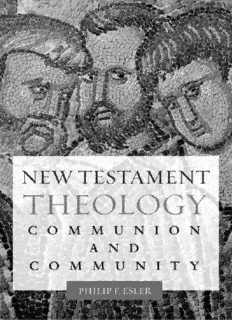
New Testament theology : communion and community PDF
Preview New Testament theology : communion and community
NEW TESTAMENT THEOLOGY NEW TESTAMENT THEOLOGY COMMUNION AND COMMUNITY PHILIP F. ESLER IN MEMORY OF ANTHONY STEPHEN ESLER 15 NOVEMBER 1985-12 MARCH 2002 CONTENTS Preface ix Abbreviations xi INTRODUCTION: THE NEW TESTAMENT AND CONTEMPORARY CHRISTIANITY 1. THE NEW TESTAMENT, HISTORY, AND THEOLOGY: THE STATE OF THE DEBATE 11 2. PERSONS IN COMMUNION: A SOCIO-THEOLOGICAL MODEL 38 3. KNOWING AND UNDERSTANDING THE MESSAGE OF OUR ANCESTORS IN THE FAITH 67 4. THE PLACE OF NEW TESTAMENT AUTHORS IN INTERPRETATION 88 5. INTERPERSONAL UNDERSTANDING AND THE SPOKEN WORD IN SCHLEIERMACHER'S HERMENEUTICS 119 6. FACE-TO-FACE COMMUNION BETWEEN NEW TESTAMENT CHRIST-FOLLOWERS: 1 CORINTHIANS 10-14 AS A TEST CASE 148 7. NEW TESTAMENT CHRIST-FOLLOWERS AND THE EFFECTS OF WRITING 171 8. COMMUNION WITH THE SAINTS: ORIGINS AND DEVELOPMENT 191 9. COMMUNION WITH THE SAINTS: MODELING THE NATURALISTIC POSSIBILITIES 213 10. COMMUNION WITH THE SAINTS IN THE FULLEST SENSE 229 11. THE CANON AND INTERPERSONAL COMMUNION 255 12. HISTORY, HERMENEUTICS, AND COMMUNION: ROMANS 273 Notes 283 Bibliography 313 Index of Subjects 335 Index of Modern Authors 346 Index of Scripture 351 PREFACE ^his book represents the culmination of reflection over many years. Some of the ideas in it go back to the time of my doctoral studies in Oxford in the early 1980s especially my conviction that the historical investigation of what messages the New Testament authors conveyed to their original audiences must have theological significance when the texts are read in a Christian context today. Yet this work has reached its present form as a result of research I have conducted in the last few years. I was able to expose the germ of my thesis in the form of the Manson Memorial Lecture I delivered in the University of Manchester on 25 October 2001. The warm reception and helpful feedback I received on that occasion encouraged me to press on and I am most grateful for the invitation to present the lecture. The bulk of the manuscript was written during a full year's research leave in 2002-3 that was made possible by a generous grant from the UK Arts and Humanities Research Board. I have incurred many debts while thinking about or writing this book, of which I will mention a few in particular. Robert Morgan of Linacre College, Oxford, provoked my initial thoughts on New Testament theology back in my Oxford days and in the years since his writings have continued to stimulate my reflections; this year he has also offered detailed comments on some draft chapters. Alan Torrance of the University of St. Andrews was most helpful when I was formulating my model of socio-theological communion (chapter 2). Bruce Malina of Creighton University, Omaha, has assisted me with several points. I have also profited from responses to some aspects of this project by Richard Bauckham from St. Andrews and Werner Jeanrond of the University of Lund. While I am most grateful to all of these, they bear no responsibility for the views here expressed. I am also grateful for the encouragement and assistance I have received from the staff of Fortress, especially K. C. Hanson and James Korsmo, in the process of producing this book. The circumstances of the dedication of this book to the memory of my nephew, Anthony Stephen Esler (15 November 1985-12March 2002), appear in chapter 10. The Greek is based on 2 Cor 5:8: "He is at home with the Lord." St. Mary's College, St. Andrews 11 April 2005
Description: